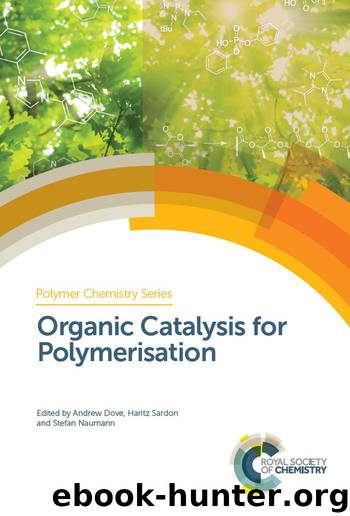Organic Catalysis for Polymerisation by Dove Andrew;Sardon Haritz;Naumann Stefan; & Haritz Sardon & Stefan Naumann

Author:Dove, Andrew;Sardon, Haritz;Naumann, Stefan; & Haritz Sardon & Stefan Naumann
Language: eng
Format: epub
ISBN: 9781788016797
Publisher: Book Network Int'l Limited trading as NBN International (NBNi)
Published: 2018-11-01T16:00:00+00:00
Figure 7.38 Amide-containing 6CC and MTC-PF favouring acidic organocatalysis for ROP.
From the viewpoint of bio-based production, glycerol-based 6CCs are an alternative including those derived from dihydroxyacetone (DHA), as shown in Figure 7.39.199 In addition, there are sugar-fused 6CCs that are derived from carbohydrates such as glucose, mannose, xylose, deoxyribose, and their derivatives.200–202 Recent advance in the cyclization technologies and CO2 chemistry allows these sugar-based polycarbonates to fully comprise natural feedstock (carbohydrates and CO2).168 These sugar-based polycarbonates exhibit high glass transition temperature (Tg) ranging from over 58 to 152 °C, depending on substituents on the fused sugar ring that contribute to restricting chain mobility.200,201,203 Thus, these sugar-based polycarbonates are expected to be applied in a new class of engineering polycarbonates as with poly(CHC) and poly(CHDC) (Figure 7.36).
Download
This site does not store any files on its server. We only index and link to content provided by other sites. Please contact the content providers to delete copyright contents if any and email us, we'll remove relevant links or contents immediately.
| Automotive | Engineering |
| Transportation |
Whiskies Galore by Ian Buxton(41524)
Introduction to Aircraft Design (Cambridge Aerospace Series) by John P. Fielding(32883)
Small Unmanned Fixed-wing Aircraft Design by Andrew J. Keane Andras Sobester James P. Scanlan & András Sóbester & James P. Scanlan(32569)
Craft Beer for the Homebrewer by Michael Agnew(17927)
Turbulence by E. J. Noyes(7690)
The Complete Stick Figure Physics Tutorials by Allen Sarah(7135)
Kaplan MCAT General Chemistry Review by Kaplan(6588)
The Thirst by Nesbo Jo(6432)
Bad Blood by John Carreyrou(6270)
Modelling of Convective Heat and Mass Transfer in Rotating Flows by Igor V. Shevchuk(6219)
Learning SQL by Alan Beaulieu(6029)
Weapons of Math Destruction by Cathy O'Neil(5820)
Man-made Catastrophes and Risk Information Concealment by Dmitry Chernov & Didier Sornette(5641)
Digital Minimalism by Cal Newport;(5384)
Life 3.0: Being Human in the Age of Artificial Intelligence by Tegmark Max(5181)
iGen by Jean M. Twenge(5151)
Secrets of Antigravity Propulsion: Tesla, UFOs, and Classified Aerospace Technology by Ph.D. Paul A. Laviolette(4974)
Design of Trajectory Optimization Approach for Space Maneuver Vehicle Skip Entry Problems by Runqi Chai & Al Savvaris & Antonios Tsourdos & Senchun Chai(4837)
Electronic Devices & Circuits by Jacob Millman & Christos C. Halkias(4739)
